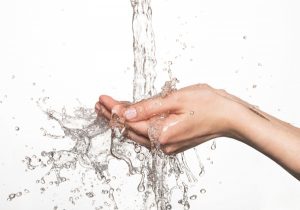When plumbers use the term “hard water,” they’re not talking about ice. Hard water is a common problem in homes across the US, and it’s something many of us are dealing with—whether we know it or not. Hard water affects how well your clothes get cleaned, how your hair feels, and when you’ll need to replace your pipes.
So what exactly is hard water and how can you get rid of it? Whether you’ve only come across the term recently or you’ve struggled with hard water for years, we’ve got some answers for you.
What Is Hard Water?
Hard water describes the level of minerals in the water flowing into your home. By some estimates, hard water affects nearly ¾ of households in the country. Thankfully, these minerals, like calcium and magnesium, are not necessarily harmful to your health. However, hard water has one result that gets people talking: scaling.
Scaling is when mineral deposits from hard water get left behind in pipes, fixtures, and appliances. You might recognize the effects of scaling if you’ve ever cleaned white or yellow residue from the faucet, sink, or showerhead, but this is the least of your worries.
How Does Hard Water Affect Your Home?
Hard water leaves behind scaling that could be destroying your pipes and appliances. That same residue you find around the sink drain or on the faucet is also building up slowly in your pipes, reducing the space in the pipes and lowering your water pressure. Eventually, enough scaling can accumulate to block water from moving through the pipes. It can stop water from moving through the dishwasher, can block up sinks, and may even destroy your coffee maker!
Besides that, one of the chief concerns of hard water is that it does not allow soap to lather. This results in a lot of trouble throughout the home and for your daily routine.
- Soap scum and residue can be left behind in the tub or the clothes washer.
- You end up using way more soap or shampoo than you need to, only to be left with greasy hair or dull skin after a shower.
- Dishes come out of the dishwasher with more water spots.
- Some people even claim the water makes food taste different!
So What Can You Do?
Now that you know how hard water affects your home, you can see that a filtered water pitcher or an under-sink filter may not be the right solution. In fact, a standard water filter alone—even a whole-home model—may not be what you need to really eliminate hard water minerals.
Truly soft water comes from a system that replaces hard water with sodium ions. A water softener, installed in the pipes to serve your entire home, removes hard water molecules. You’ll have to refill the system with a large amount of salt designed for your water softener from time to time, although salt-free water conditioners may be available. Talk to a water treatment specialist to learn more!
The plumbers at Continental Plumbing Services, LLC offer water softener installation and service in New Port Richey, FL. Call us today!

